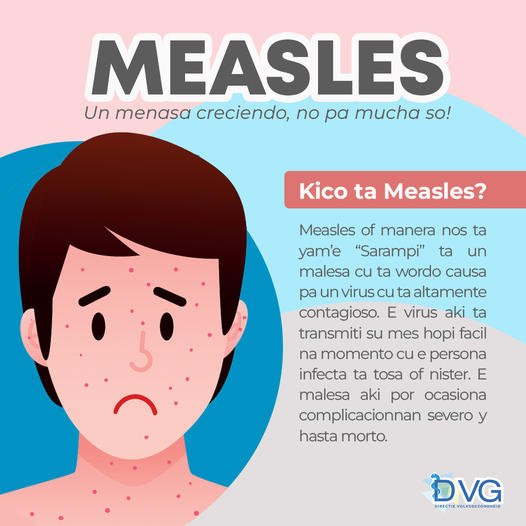Measles, a global threat
ORANJESTAD – The World Health Organization (WHO) is warning the world about the increase in measles cases.
Measles is one of the most contagious diseases caused by the morbillivirus transmitted through the air when an infected person coughs or sneezes. It can cause severe complications and even death. Before the introduction of the measles vaccine in 1963, many children, especially those under five years old, died from this disease each year. Since its introduction, cases have decreased worldwide, and in Aruba, the disease has not been detected since its introduction in 1979. It is due to the high vaccination rate (95%) among children aged 0 to 10.
Recently, the World Health Organization (WHO) has once again raised the alarm over the increase in measles cases in various European countries (40 countries) and the United States (18 states) among both children and adults. There are two cases recently confirmed in the Caribbean. Health organizations worldwide consider the measles outbreak to be due to a decline in vaccination rates, particularly after the COVID-19 pandemic. Various parents decided not to vaccinate their children against measles, which has lowered the country's immunity and increased the risk of the virus spreading among the unvaccinated community and the most vulnerable.
The Department of Public Health (DVG) started meetings with various partners to create a plan to reduce or mitigate the possibility of Aruba getting an imported case of measles. As with the COVID-19 virus, there is no way to stop the measles virus from spreading throughout our nation. Aruba must be well-prepared to manage its transmission and offer protection to the group of citizens most at risk of falling ill or even dying if they come into contact with the virus.
In the coming days, DVG will inform the community about developments regarding the measles virus.
For more information, like the DVG Facebook page: Directie Volksgezondheid DVG Aruba, follow DVG on Instagram: directie_volksgezondheid_aruba, visit www.dvg.aw, call 5224200, or send an email to servicio@dvg.aw.

